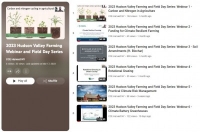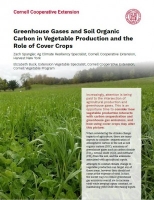Ag Climate Resiliency
 Harvest NY's Ag Climate Resiliency program aims to mitigate the impact of climate change on New York's farms through education, adaptation of production practices, and preparation for extreme weather events. Additionally, the team emphasizes the important role farms play in reducing greenhouse gas emissions and carbon sequestration. Key practices include use of cover crops, agroforestry, rotational grazing, water management, manure management, and nitrogen-use efficiency.
Harvest NY's Ag Climate Resiliency program aims to mitigate the impact of climate change on New York's farms through education, adaptation of production practices, and preparation for extreme weather events. Additionally, the team emphasizes the important role farms play in reducing greenhouse gas emissions and carbon sequestration. Key practices include use of cover crops, agroforestry, rotational grazing, water management, manure management, and nitrogen-use efficiency. Webinar Recordings: 2023 Hudson Valley Farming Series
Jenna Walczak, Ag Climate Resiliency Specialist
Harvest New York
Last Modified: March 27, 2023

The 2023 Hudson Valley Farming Series: Farming in a Changing Climate included six webinars with speakers presenting on carbon and nitrogen cycling in agriculture, financial and technical assistance for ag climate projects, biochar and soil amendments, rotational grazing, practical climate risk management, and climate battery greenhouses.
Factsheet: Greenhouse Gases and Soil Organic Carbon in Vegetable Production
Zach Spangler, Ag Climate Resiliency Specialist
Harvest New York
Last Modified: December 15, 2022

The intersection of agricultural production and greenhouse gases is gathering increasing attention. This is an opportune time to consider how vegetable production interacts with carbon sequestration and greenhouse gas emissions, and how using cover crops may alter this picture.
The factsheet, Greenhouse Gases and Soil Organic Carbon in Vegetable Production and the Role of Cover Crops, discusses:
- Sequestration of atmospheric carbon in agricultural soils as soil organic carbon (SOC). Is vegetable production impacting SOC?
- Net greenhouse gas emissions of carbon dioxide (CO2), nitrous oxide (N2O), and methane (CH4) from the soil.
- Impact of cover crops on soil organic carbon, nitrous oxide emissions, and other GHG emissions.
Upcoming Events
Urban Ag Food Safety Webinar
March 11, 2026
12:00 pm - 1:30 pm
Urban and small-scale producers are encouraged to join us for the Urban Ag Food Safety webinar, featuring speakers from Cornell Cooperative Extension and Cornell IPM. We will explore the 'why' behind food safety, providing a basic overview and diving into specific urban ag considerations including water, pest, rodent, and soil health challenges. We will touch on the regulation and marketing landscape, and share resources for learning more. Bring your questions!Companion Planting in the Garden -- With Mushrooms!
March 12, 2026
10:00 am - 11:30 am
Learn how to diversify your garden harvest with companion planting at this virtual workshop. Plan next spring's garden with guidance CCE Harvest NY Urban Agriculture Specialist Yolanda Gonzalez on growing three different types of mushrooms.2026 Rochester Urban Agriculture Conference
March 21, 2026
9:00 am - 4:00 pm
Rochester, NY
Join us for our annual Rochester Urban Agriculture Conference, a day of learning and connections featuring interactive workshops, community knowledge sharing, Fruition's Gift of Seed Experience, horticulture tables and displays, and more!Announcements
Community Gardens Soil Testing Program Accepting Applications
Soil testing supports the growth and expansion of community gardens by protecting the health and safety of the food produced in these gardens. CCE Harvest NY, in partnership with the NYS Department of Agriculture & Markets (AGM) and the Cornell Soil Health Lab, is offering eligible, food-producing gardens in New York State the opportunity to send soil samples for testing without charge.The soil test will analyze samples for heavy metals and nutrient levels. Test results help gardeners make appropriate plans to produce high quality fruits, vegetables, and flowers. Technical support and education for participating growers will be available from the CCE Harvest New York team. Learn more about the 2026 Community Gardens Soil Testing Program.
2025 Year in Review
2025 was another year of growth and accomplishment for CCE Harvest NY! Our 2025 Year in Review highlights our impacts and details our work.- Farm to School Local Procurement by the Numbers
- Biochar in the NYC Urban Agriculture Landscape
- Harvest New York Supports Farmer-Led Research Advancing Upland Rice Production in New York State
- Community Garden Soil Testing Program Yields Great Results
- Regional Roots: Culinary Training to Enhance School Meals with Local Foods
- Rooted in Learning: Strengthening Farm to School Connections Across New York
- South Lawn Farm Expands Fresh Food Access and Urban Farming Opportunities
- NYS Summit Advances the Mushroom Industry
- Research to Manage Pests in Blueberries with Less Sprays
- Building a Research and Extension Hub at Brooklyn Botanic Garden
- A Successful Community Garden Leadership Program Pilot
- Farm to School Events Deliver Education, Culinary Training, and Business to Business Opportunities
- A Trusted Source of Science-Based Information for the Cannabis sativa Hemp Industry
- Sustainable Pest Management for New York Urban Farmers
- Cultivating Resilience: Harvest New York Drives the State's Climate Goals Through Research and Outreach
- Expanding Agritourism Outreach Across New York State
- Coordinating City Agencies, Academia, and Community Gardens to Improve Urban Soils
- USDA Urban Agriculture Training Development Complete
